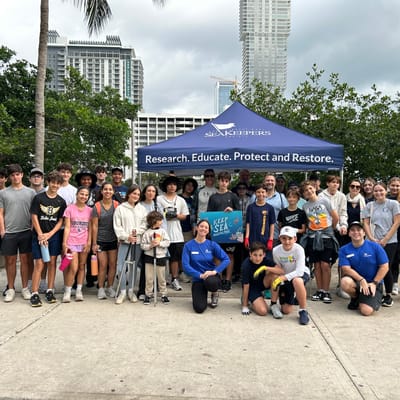Monthly Margaret Pace Cleanup
Miami, Florida
February 23, 2025
Overview
On the morning of February 23rd, 2025, The International SeaKeepers Society hosted our monthly cleanup at Margaret Pace Park in Miami. We were joined by 45 volunteers who we met near the shoreline of the park and gave a quick site briefing as well as an explanation on SeaKeepers as an organization. Our volunteers then picked up their gear and spread out all over the park, a great deal of them emphasizing the shoreline which was inundated with trash thanks to recent storms. Our volunteers were not only able to collect a massive amount of trash from the mangroves and the terrestrial areas of the park alike but were also able to collect data to be shared with scientists on the most common types of trash through the use of Citizen Science app Marine Debris Tracker. After just two hours of hard work, we had removed more than 200 lbs of trash from the park, mainly in the forms of various types of plastics and glass. Some of our volunteers managed to find some extremely uncommon items, such as shoes and even a leftover mattress that had washed up on the park’s shores. Despite these strange finds, the vast majority of our collected trash were smaller plastics like bottle caps, cigarette butts, and many more. We give a huge thanks to our volunteers for joining us and for their incredible work, and we look forward to hopefully seeing some of them at future events!
Marine Debris Tracker is a data collection app that allows the general public to contribute to an open-date platform and scientific research by recording the different types of litter, specifically plastic pollution, that they find in either inland or marine environments. Marine Debris Tracker was developed by the University of Georgia’s Jambeck Research Group, which SeaKeepers worked with in 2021 when the Jambeck Research Group collaborated with Ocean Conservancy to assess Miami’s plastic waste management, known as a Circularity Assessment Protocol. SeaKeepers again assisted the Jambeck Research Group’s Circularity Informatics Lab in 2022 with another Circularity Assessment Protocol in the Florida Keys. The researchers of the Jambeck Lab use the Marine Debris Tracker app to record their data, and with citizen scientists also using the app, more data can be collected in different areas. Using Marine Debris Tracker at our cleanups involves community members in creating a bigger picture of plastic pollution, and provides the means for new scientific findings to be generated as well as for effective local legislation to be informed. SeaKeepers is excited to be incorporating this app at our cleanups and continue our mission of coastal education, protection, and restoration. In this cleanup, 47 percent of volunteers participated in using the app to record data.


You must be logged in to post a comment.